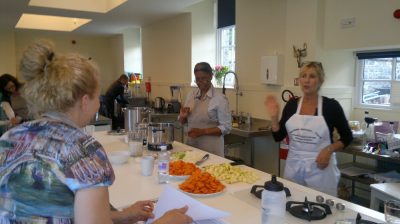Conquer Your Kitchen

The kitchen cupboard is the nerve centre of your kitchen – keep it well stocked and you will save time dashing to the shops for that single ingredient, and will always have a delicious meal at hand even when the fridge is looking bare. Here are some of my top tips to make your kitchen work for you.
Tasty dressings
You can make delicious sauces and dressings and wonderful-tasting dips using all-natural ingredients that incorporate the five tastes. Toasted sesame tahini, umeboshi plums, brown rice syrup and barley malt, shoyu, sweet white miso, fresh ginger juice, lemon juice, and tofu, the possibilities are endless. All of these delicious dressings can be used on salads, boiled vegetables, noodles or pasta, and sea vegetables. Many of them can be stored in the fridge for up to five days.
Quick bites and roll-overs – cook once, eat twice
Time savers are a great way to cook your food. Cook double and use the rest for tomorrow’s lunch. Cook more than you need and freeze the rest. A good idea is to freeze in small portions, so you have ‘ready-made’ meals when time is of the essence.
- Make a weekly menu plan – it makes it possible to use leftovers efficiently and makes meal preparation simpler.
- Make double the sauce and use for another dish later in the week.
- Salad dressings are easy to prepare in larger batches. Depending on the dressing, it will keep for at least a week, although some can be stored for a month or longer. Dressings are versatile and can be used not only on salads but to also dress up simple vegetable and grain dishes and add a quick boost of flavour.
- Cut enough fresh vegetables for several days and store in an airtight container so that all the cutting is done and you can cook quickly.
- Peel and chop carrots, onions, etc., bag them and freeze. When needed, just take out as much as you require and reseal. Not perfect, but helpful.
- Mince fresh garlic and keep it in the refrigerator for ready use. Minced garlic will keep for about two weeks in the refrigerator in a sealed container.
- Juice several fresh lemons or limes at a time and store the unused juice in the refrigerator in a sealed container. This will save time when putting together salads, dressings and other recipes. Fresh lemon juice will keep for about ten days.
- Beans will last three days in the refrigerator after being cooked. Cook enough beans to use in a soup, stew or casserole. I cook up batches of adzuki beans and freeze them in portions.
- Grains will last up to five days in a sealed glass container in the refrigerator. I make our short-grain brown rice porridge for breakfast in one batch that lasts us through the working week. I simply warm the required amount each morning for breakfast by adding some water (you could use a rice milk). Grains and beans are good to reuse with a nut or seed garnish, but make the vegetables fresh.
- Prepare larger amounts of brown rice, beans and other longer-cooking foods and freeze them in small portions so they will defrost more quickly when you need them and will be the right amount required for the number of people you are serving.
- Learn how to use a pressure cooker, crockpot or slow cooker. Pressure cooking can cut standard cooking times by about two-thirds, while preserving more nutrients than conventional cooking methods.
- Purchase some good organic soup stock cubes. I use umami instant stock sachets that instantly deliver a delicious base for all my soups, stews, risottos, pies and even stroganoffs.
- Sea-vegetable dishes last for days. Cook up a good amount and then use a small portion every other day. I switch between, arame, hijiki and nori.
- Always have some wholegrain pasta (brown rice pasta is good), bulgur, couscous and other partially refined grains at hand for last-minute meals.
- Have a stock of shop-bought organic cooked beans and other foods on hand for when you get stuck.
- Choose two new recipes from your cookbooks every week so that you are constantly expanding you range of dishes and your familiarity with the foods.
- Adding some raw vegetables or sprouts to each meal is a winner and it’s simple as no cooking is required!
Replacements
There are some foods commonly used in cooking that we avoid for health or ethical reasons. You can be creative and use replacements that will give you the tasty results you expect. Most of them have to do with recreating the ‘mouth feel’ of another food. You will be pleasantly surprised with your results.
Replacing eggs
1 egg = 1/4 cup puréed pumpkin
1 egg = 1/4 cup puréed prunes
1 egg = 1/2 mashed banana
1 egg = 1/4 cup silken tofu, blended
Replacing fats and oils
1 cup oil = 1/2 cup apple sauce or pumpkin purée
1 cup butter =3/4 cup pumpkin purée
Replacing milk
Oat milk
Soy milk
Rice milk
Cheese flavours
Nutritional yeast
Nut-based cheese
Replacing sugar
1 cup sugar = 1 cup apple sauce or banana purée
1 cup sugar = ¾ cup puréed dates
Other sweeteners
Fruit purée
Balsamic glaze
Banana purée
Real fruit jam
Fruit preserves
Dried fruits
Barley malt
Rice syrup
Maple syrup
For sautéing use filtered water or vegetable broth, and for roasting vegetables, if you cook them slow at a low temperature they will brown beautifully. I often mist the vegetables I am roasting with a water spritzer and then add some sea salt and my favourite herbs. Always line the roasting pan with parchment paper to avoid the vegetables sticking. For deep frying there are many alternatives, an air fryer being one of them – crispy foods but without the artery-clogging oils.
In good heath


